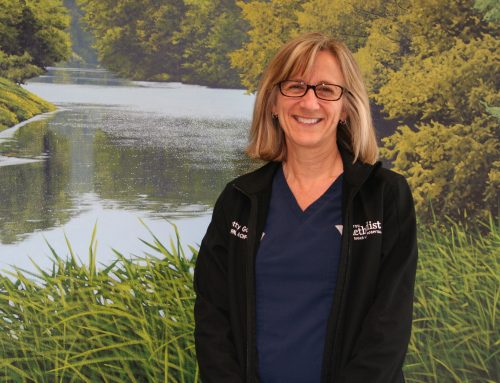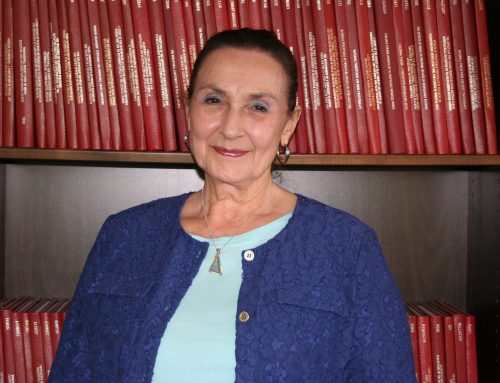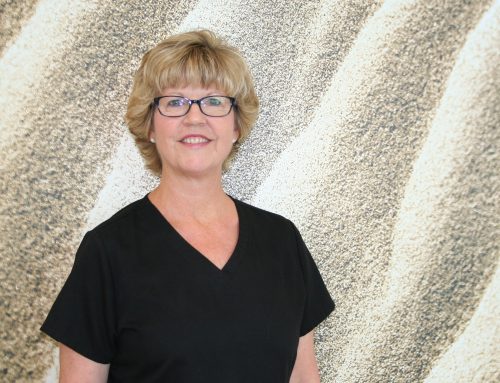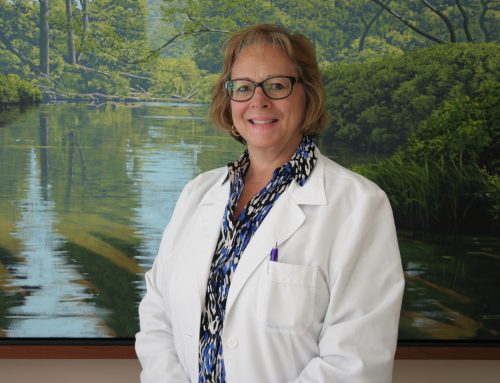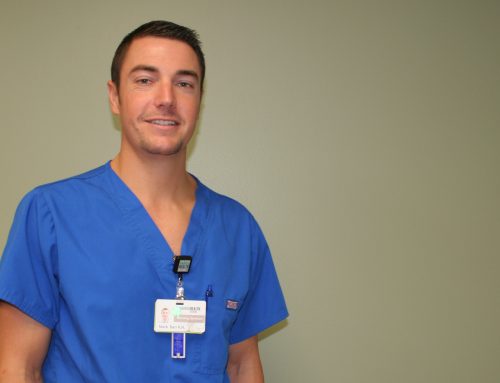2016 Gold Medalist – Clinical Practice in a Small Hospital
Allison Damron, MSN, RN, ACNP-BC, Houston Methodist Sugar Land Hospital
Allison Damron went to Texas A&M University with the hope of continuing on to medical school, but after a few courses of organic chemistry, she changed her mind. “My mother encouraged me to continue to look at career possibilities in the healthcare industry so I volunteered at a local hospital and found that I really enjoyed the nursing aspect. I knew that was the direction I wanted to go.”
Allison received her bachelor’s degree in biology at Texas A&M University in 2005 and was accepted to the School of Nursing at The University of Texas Medical Branch at Galveston, graduating with her BSN in 2007. After two years of nursing practice – the minimum level required for entry to graduate school – she pursued her master’s in nursing at UTMB. Working while she was in school gave her the opportunity to practice what she was learning. She joined Houston Methodist Sugar Land Hospital in 2010, during the last year of her graduate nursing clinical rotations.
“I lost my mom from rheumatoid arthritis this past January and was in the unique role of taking care of her as her daughter and as a nurse practitioner,” Allison says. “Working as a healthcare interpreter for my father at her bedside gave me an appreciation of the role nurses play in communicating with families who are afraid and anxious. For a week and a half, I was on the family side and the nursing side at the same time. It was difficult but it made me really appreciate what we do here on the units for patients and their families.”
A month later she had the opportunity to give back. In February, a code blue was called to a room on the medical-surgical floor at Houston Methodist Sugar Land. As one of the nurse practitioners covering the hospital that day, Allison was one of the first providers on the scene in the room.
“The person who needed the urgent medical attention was in fact the husband of the patient assigned to the room,” she says. “I knew the patient and her family well – she was an elderly woman who had been through a long and difficult stay in our ICU. Her family – husband, daughter and son-in-law – had required a lot of counseling and care due to the patient’s critical condition. The day before the code blue, the family had decided to change the patient’s status to hospice care. Her husband, who was in his 90s, was heartbroken and wanted to be by his wife’s side continuously.”
When Allison arrived in the room, the patient’s husband was on the floor and unresponsive. His son-in-law was performing CPR, and the nurses were hurrying to intervene and initiate lifesaving care.
“I noticed that the husband was regaining consciousness, so I stopped CPR and checked his vitals,” she says. “He was awake and alert, but his heart rate was very slow. All of us were concerned, but the husband’s only thought was staying with his wife, who was very near death. His heart condition required urgent attention.”
Allison worked with the house supervisor, the charge nurse, the hospital admitting staff, and the outpatient cardiologist to get the patient’s husband admitted to a room next door. Orders were written so that tests could be run and the husband would not have to leave his wife. But before most of the tests were even completed, the patient passed away.
“She took her final breaths with her husband holding her hand and comforting her,” Allison says.
“After allowing him to say goodbye, we began his treatment.”
Betty Gonzales, DNP, RN, ACNP-BC, CCRN, director of the nurse practitioner service at Houston Methodist Sugar Land, asked Allison to write the story as an exemplar for the hospital’s Magnet® documentation. Dr. Gonzales later nominated her for the Good Samaritan Foundation’s Excellence in Nursing Award.
“Allison Damron is one of my remarkable NPs,” Dr. Gonzales wrote in her nomination. “It is not out of the ordinary for us to care for dying patients, as we see that scenario all too often. What is remarkable is that we never forget that we touch lives beyond the acute illness, beyond a snapshot in time, and beyond ourselves. The most heartwarming moments are when we realize that our patients and colleagues touch us, too. This is the rewarding part of nursing – the part of our profession that makes each day special.”
Allison says she was honored that her supervisor “would think to recognize me for something that I saw as a small act of kindness in the middle of our hectic and complicated jobs. With the help of everyone on the team, we made sure that a husband wouldn’t have to leave his wife’s side while she was dying. To me that felt simple and easy, and it didn’t feel worthy of anything other than a thank you from the family.
“It sounds cliché but I’ve learned from my patients that life is short and to appreciate the days you have with everyone,” she adds. “I’ve learned to be patient with family members because no matter how old your loved one is or how sick they’ve been, it’s really hard to say goodbye. Having gone through it myself, I appreciate every step of it, and I’m honored to be a part of that for other people. I remember feeling so grateful to work alongside people who truly understand the needs of both the patient and the family. Patient care does not stop at the patient – it extends to all of the family in the room.”
Allison says the Good Samaritan Award means a lot to her because it recognizes a small act of kindness in the middle of a big complicated job. “Nurses are appreciated every day for the big things we do – for saving lives and for the medicine we practice. It’s really wonderful to be appreciated for a small thing that made a big difference to a family.”
